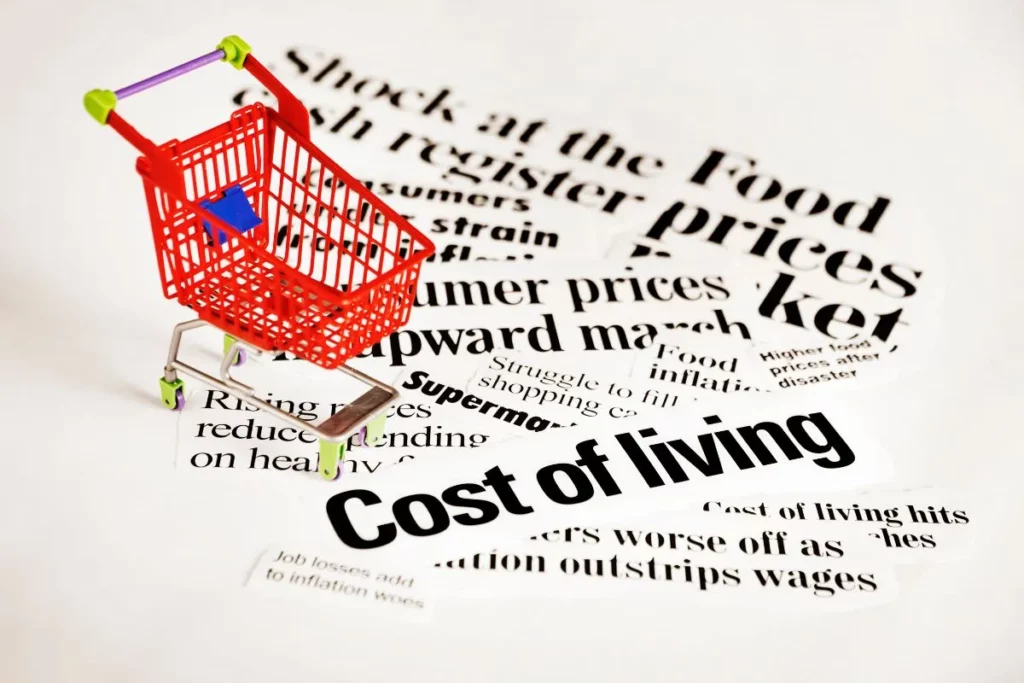Cost of living: Strategies to save money in times of crisis
Discover cost of living: strategies to save money in times of crisis with practical tips and expert advice to secure your financial future. Read More

The current economic climate challenges households across the UK. Many people face rising expenses, stagnant incomes and uncertainties about the future. This article explores the cost of living crisis and provides actionable strategies to save money in times of crisis.
Understanding the cost of living crisis
Economic instability affects everyone. Prices for essentials like food, housing and energy continue to rise. Inflation and global events contribute to the pressure on household budgets. This situation forces individuals and families to review spending habits and consider new approaches to saving money.
Economic experts suggest that cost of living challenges result from several factors. These include disruptions in supply chains, increased demand for resources and changing employment conditions. In this context, understanding the underlying issues is the first step towards finding solutions.
Recognising the challenges
People experience the cost of living crisis in different ways. Many households struggle to meet monthly bills, while others face uncertainty about future expenses. Common challenges include:
- Rising energy bills that strain monthly budgets.
- Increased food prices that make healthy eating less affordable.
- Higher costs for transport and childcare.
- Limited disposable income to cover unexpected expenses.
These challenges require proactive measures. By recognising them early, you can adopt strategies to reduce your financial burden and plan for the future.
Assessing your financial situation
A clear picture of your finances helps you identify where you can save money. Start by listing your income and fixed expenses. Then, compare this with variable costs and discretionary spending. This exercise can reveal potential savings. For example, you might notice that subscriptions and memberships add up over time. Eliminating or negotiating these expenses can have a significant impact on your monthly budget.
Creating a detailed budget using a simple spreadsheet or a budgeting app can also help track spending. By reviewing your budget regularly, you can adjust to changes in the economy and ensure that you stay on track.
Practical strategies to save money
Taking practical steps can help you manage rising costs without compromising your lifestyle. Consider the following strategies:
- Review your subscriptions and memberships: Cancel any services you do not frequently use. Evaluate monthly costs and switch to annual plans where discounts are available.
- Plan your meals and shop smartly: Create a weekly menu and make a shopping list. Compare prices across different supermarkets and take advantage of loyalty programmes. Buying in bulk for non-perishable items can reduce overall costs.
- Reduce energy consumption: Adopt energy-saving habits such as turning off lights when not needed and adjusting your thermostat. Consider investing in energy-efficient appliances. Check government websites like UK Government Energy Savings for tips and potential grants.
- Use public transport or carpool: Save money on fuel and maintenance by opting for public transport or sharing rides. Many cities now offer affordable bus and train passes.
- Negotiate bills: Contact utility companies and service providers to discuss better deals or discounts. This approach often leads to reduced monthly payments.
- Embrace second-hand shopping: Buying used items for clothing, furniture and electronics can significantly lower your expenses.
- Prioritise debt repayment: Focus on reducing high-interest debts. A structured repayment plan can save money on interest charges over time.
- Utilise free resources: Libraries, community centres and online learning platforms offer free access to books, courses and entertainment. These resources can help you maintain a high quality of life without extra spending.
- Consider a side hustle: Explore opportunities to earn extra income through freelance work or part-time jobs. This additional income can ease financial pressure.
- Monitor and adjust your spending: Regularly review your expenses and seek ways to cut costs further. Small changes add up over time.
Each of these strategies is designed to be simple and effective. They focus on real-life actions that anyone can implement to reduce expenses and enhance financial stability.
Cost-effective lifestyle changes
Adapting your lifestyle to current economic conditions may seem challenging, but even small changes can lead to significant savings. Here are some cost-effective lifestyle adjustments:
Energy efficiency at home
Invest in measures that lower your energy consumption. Simple changes such as installing LED bulbs, sealing drafts and using smart thermostats can lead to long-term savings. Research from BBC News Business suggests that energy efficiency improvements can reduce monthly utility bills substantially.
Healthy and affordable eating habits
Eating well on a budget is possible with careful planning. Shop for seasonal produce and use local markets, which often offer fresher and cheaper alternatives to supermarkets. Preparing meals at home also allows you to control portion sizes and reduce food waste. Consider community-supported agriculture schemes that provide a regular supply of local produce.
Minimalist living
A minimalist lifestyle emphasises purchasing only what is necessary. This approach can help you avoid impulse purchases and reduce clutter. By focusing on quality over quantity, you ensure that each expense is justified and adds value to your life.
Transportation and travel savings
Consider cycling or walking for shorter distances. Not only do these options save money, but they also improve your health. For longer journeys, compare travel options and book tickets in advance to secure the best prices.
Leveraging government and community support
During times of crisis, the government and local communities often provide support programmes. Investigate available resources to help ease your financial burden. For example:
- Government grants and benefits: Visit the UK Government website for information on benefits and financial assistance programmes. These initiatives can offer temporary relief during difficult times.
- Community initiatives: Many local councils organise free financial advice sessions, food banks and energy-saving schemes. Participating in these programmes can help you access practical support and advice.
- Financial counselling services: Organisations such as Citizens Advice provide free and impartial financial advice. Their expert guidance can help you navigate debt management and budgeting challenges.
Utilising these resources not only helps you save money but also builds a sense of community and shared resilience.
Planning for future financial stability
While immediate savings are crucial, planning for long-term financial stability is equally important. Consider the following actions:
Build an emergency fund
An emergency fund provides a financial cushion during unexpected events. Aim to set aside a small percentage of your income each month. Over time, this fund can help you manage unforeseen expenses without resorting to high-interest loans.
Invest in your financial education
Understanding personal finance is essential. Read books, attend workshops and follow trusted online sources to improve your financial literacy. For further reading, consider resources available on this page. A deeper understanding of budgeting, saving and investing can empower you to make informed decisions.
Consider long-term investments
Even in uncertain times, investing can offer future benefits. Speak with a financial advisor to explore options that suit your risk tolerance and long-term goals. Investments in diversified portfolios can help mitigate risks associated with market volatility.
Stay informed on economic trends
Keep up to date with economic news and trends that may affect your finances. Reputable news sources such as The Guardian Business provide insightful analysis on the economy. Staying informed allows you to adjust your strategies as circumstances change.
Embracing a proactive mindset
Adopting a proactive approach to managing your finances is crucial. Rather than waiting for the situation to worsen, take control now. Regularly review your budget, set clear financial goals and monitor progress. A proactive mindset not only helps you manage current challenges but also prepares you for future uncertainties.
Reflect on your spending habits and ask yourself:
- What expenses are essential and what can be reduced or eliminated?
- How can I make small changes that add up over time?
- Which community resources and support programmes can I utilise?
Answering these questions can provide clarity and direction during challenging times.
Case study: A practical approach to saving money
Consider the example of Sarah, a resident of Manchester. Faced with rising living costs, Sarah decided to take a structured approach to her finances. She began by creating a detailed budget and identifying areas where she could reduce expenses. Here are the steps she took:
- Tracked daily expenses: Sarah recorded every purchase, which helped her identify unnecessary spending.
- Reduced energy consumption: She switched to energy-efficient appliances and adjusted her thermostat settings.
- Planned weekly meals: Sarah organised her meals around seasonal produce and local market deals.
- Eliminated non-essential subscriptions: She cancelled several streaming services she rarely used.
- Built an emergency fund: Sarah set aside a portion of her income every month, gradually building a financial safety net.
By following these steps, Sarah managed to reduce her monthly expenses significantly. Her experience demonstrates that practical, manageable changes can have a profound impact on financial stability.
Implementing sustainable habits
A shift towards sustainable financial habits can lead to lasting benefits. Sustainable habits not only save money but also reduce your environmental footprint. Consider these approaches:
- Reduce waste: Recycling and reusing items minimizes expenses. For example, buying second-hand clothes or repurposing household items can reduce costs while supporting environmental sustainability.
- Invest in quality: Purchasing high-quality items may have a higher upfront cost but can save money in the long term due to durability and lower maintenance.
- Adopt a long-term view: Sustainable financial practices are built over time. Commit to gradual changes rather than expecting immediate, dramatic results.
Sustainable habits require commitment. However, the long-term rewards—both financial and environmental—are well worth the effort.
The cost of living crisis demands practical solutions and proactive management. By understanding your finances, adopting cost-effective strategies and staying informed, you can navigate these challenging times. The steps discussed in this article offer a clear path to saving money and securing your financial future. Start small, track your progress and remain open to change. Remember that even minor adjustments can lead to significant savings over time.
Economic challenges may seem overwhelming, but by taking control of your finances, you can improve your quality of life. Make use of available resources such as government support programmes, trusted financial advice websites and community initiatives. Embrace sustainable habits and plan for long-term stability. Your financial future depends on the actions you take today.
For further insights and additional strategies, visit this page. Staying proactive and informed is key to overcoming the challenges of a cost of living crisis.




